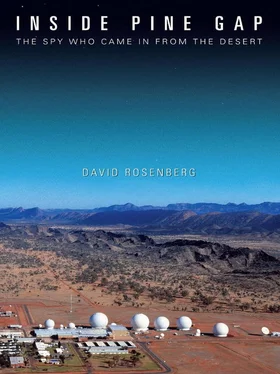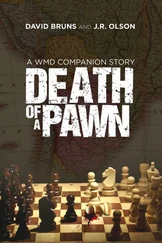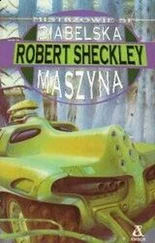When I finished, the male polygrapher, who resembled my idea of an accountant rather than a ‘spook’, asked me to relax as he left the room. After about five minutes, he returned and said that he needed to ask me a few more questions. (I would find out later that the agency wasn’t happy with how I’d responded to the drug-related questions.) The questions were repeated and when I finished I was told the agency would let me know how I did within two weeks. I felt I’d done well as I was honest with all my answers, and as I flew back to Miami my only concern was the nervousness I’d felt when answering the drug questions.
Two weeks later I received a letter from the NSA telling me I needed to fly back to Maryland and complete another polygraph as I’d failed my first test. I was pretty depressed about the result, but made the flight arrangements and was back in Maryland the following week. I went into the same polygraph area but this time a female polygrapher conducted the test. She told me that they weren’t satisfied that I’d disclosed all of my previous drug use. I reassured her that I’d been honest and was ready to take the test again.
When we were finished she left the room only to return a few minutes later to tell me she needed to repeat some questions. After which she again left the room, returning shortly to ask me even more questions. Now I was really beginning to get nervous! Why were they asking me the same, mostly drug-related questions over and over? But I was also becoming a bit of an expert at answering the questions, and was always consistent in my responses. We soon finished up and I was told I’d receive the results after I returned to Miami.
About a month passed and I still hadn’t heard anything from the CIA, but I soon received yet another request from the NSA for me to take a third polygraph because the second test had also ended in failure. Though the results were obviously discouraging I was also optimistic: the agency’s willingness to fly me back for two additional tests clearly meant it was seriously interested in hiring me.
So in October I found myself back in now-familiar territory at NSA headquarters. I knew the drill and was soon in the polygraph room, hooked up to the wires with a male polygrapher conducting the interrogation. The same questions about drug use came up and I answered them calmly, smiling just a bit to myself as each question was asked—I believed this technique would reduce any nervousness I’d felt on previous occasions. I suspected this was the last chance I’d get to take the test, believing a ‘three strikes and you’re out’ rule probably applied. As usual, when the questioning was over the polygrapher excused himself and left the room. But this time, when he returned, he told me the results looked good. I was elated and was hopeful that I had finally passed.
A month later, as luck would have it, I received a letter from the CIA offering me employment at the government grade/step level of 7/4 (see Appendix C), which was on the higher engineers’ pay scale and was typical of what the CIA offered recent graduates with a Bachelors degree. The annual salary was $26,627 (approximately US$53,000 in 2011). This was significantly more than I had ever earned and I was ecstatic knowing the opportunity to work as a hi-tech spy for the CIA was now a very real possibility. I didn’t have to accept the offer right away as it was contingent on passing a screening process that involved medical, psychological and polygraph testing as well as a background check. In the meantime I was asked to remain discreet about my possible employment, even to the point of not including my name on its return envelope.
Unfortunately, the CIA’s letter made it clear to me that I had one unpleasant task to perform: I had been dating a beautiful girl from Colombia, but I knew I had to break up with her because I would probably be moving to Virginia and she was a foreign national. I explained that the government agency that wanted to hire me had concerns about security-cleared employees dating non-American citizens, and that such relationships meant answering numerous questions and filling out extensive paperwork. When we met, she’d told me she was separated from her husband, whom she described as a ‘hot-blooded Puerto Rican with a motorcycle and a gun’. She was so stunning that I’d been willing to risk an encounter with an angry, estranged husband with an itchy trigger finger, but since she wasn’t a United States citizen, and since I was probably going to leave North Miami very soon, I knew the time had come to end the relationship. Neither of us was happy about it, but I have to admit that I did breathe a bit easier now that I had one less gun in my life.
The new year started off with good news: I received a letter from the NSA offering me a job (see Appendix D). I’d passed my third polygraph test! The agency was willing to employ me at the government grade/step of 7/8—even better than what the CIA had offered, with a salary of $27,328. My background investigation had already been completed by the Defense Investigative Service (DIS) and many of my friends had related how they’d been interviewed by ‘some guy from the government’ asking questions about my loyalty, drug use and, of course, whether I was homosexual.
I now had a decision to make. The CIA was still conducting its background investigation and I didn’t know how much longer that would take. I thought about the people I’d met at both agencies and the descriptions of the jobs I’d been offered. The people at the NSA seemed friendlier, and more organised when it came to my pre-employment processing—in spite of my three polygraphs—and the work in ELINT analysis was more tempting to me than building and testing new hardware. Also, the opportunity to use my maths skills in ELINT appealed more to me than using my training as an engineer for the CIA. My mind was soon made up: even though the NSA was relatively unknown to the rest of the world, I decided to accept the job offer and agreed to report for work on 24 February 1986.
The NSA asked me to tell only my immediate family and closest friends about my employment, and to tell them not to share the news with anyone. I had expected this. If asked, my family, friends and I were to say that I worked for the Department of Defense. (I later learned that if a civilian told you they worked for the Department of Defense, that vague term often meant that they worked for the NSA.)
I had one month to make arrangements for the move from North Miami, find a place to live and prepare myself for the new experience of living in the cold and snow that awaited me in Maryland. My family and friends celebrated with me and while I knew I would miss them, I was excited about beginning my secretive career as a new government hi-tech spy. Although I didn’t know exactly what my job would be, I was keen to get behind the scenes and start doing important work for my country. I was confident I’d made the right choice. In the end it seemed fortuitous, inevitable even, that my applications to private industry hadn’t been successful. I recalled my childhood love of Mission: Impossible , and its introduction seemed to ring in my head: ‘Your mission, Jim, should you decide to accept it’… I did, indeed, eagerly accept my own impending mission with the NSA.


The author at the Berlin Wall
In late February 1986 I drove up to Maryland and booked myself into a hotel in Laurel, where I would stay until I found a one-bedroom apartment called Foxfire. Heavy snow covered the city, and driving safely on ice took some practice. I had arrived a few days before I was scheduled to begin orientation and I spent the time learning my way around town and finding my way to work.
Читать дальше














